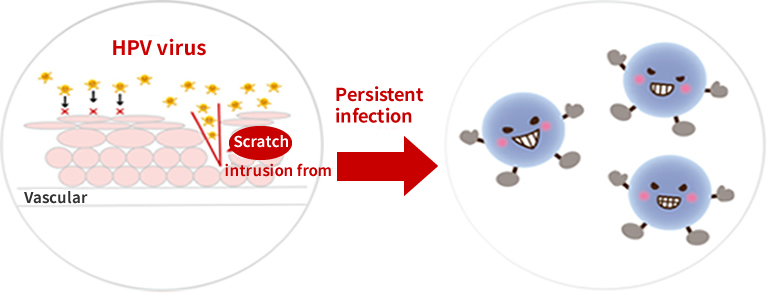To an Individual
Cervical cancer can be detected before the cancer develops. In other words, regular examinations can help you detect and prevent early, and save your uterus and ultimately your life.
About Cervical Cancer
Cervical cancer is caused by a virus called HPV. There are more than 100 types of this HPV virus, of which at least 15 are considered to be the cause of cervical cancer.
HPV is a virus that infects the skin and mucous membranes. The main infection route is sexual intercourse, and sexual contact only by mouth or hand.
Approx. 90% of infected HPV disappears naturally due to the immune system and cell metabolism of humans. However, if the virus is not eliminated and is continually infected for a long time, cells that cause cancer will emerge from it.
It is important to have a cervical cancer examination at least every two years to early detect cell abnormalities (carcinogenesis) due to HPV or other causes by cytological tests.
Although it is generally considered to take 7 to 10 years or more to change from infection to cells that cause cancer, there have been cases of rapid progression recently.
The incubation period is long and you get almost no symptoms until the onset of cancer. Therefore, you should take care of yourself and don't be relieved just because “I am young" or "I have no symptoms".

About Sexually Transmitted Diseases (STDs)
What is STDs?
There are several terms that apply to STDs; however, they all have the same meaning as "infectious diseases transmitted by sexual activity (sex, oral sex, kissing, etc.)".
It means that it is important to understand contraception and STDs prevention because STDs infections occur without sexual intercourse.
We believe that the most reliable prevention is to make sure that you and your partner are not infected with STDs before prevention with condoms etc. And if you are infected, it is possible to prevent it from becoming chronic (or severe) by treating it earlier and to cure it completely depending on the infection.
Even with such a little correct knowledge, the spread of STDs can be prevented. Get the correct knowledge and protect yourself.
As it mentioned above, you get almost no symptoms.
In rare cases, when men are infected with gonorrhea or chlamydia, they develop symptoms of secretions such as pus and pain. In addition, women have symptoms such as changes in their cages although women often do not notice the symptoms.
Even if you don't have any symptoms, ideally, you should have a test when your sex partner changes to a new one, and regular tests are essential.
Types of STDs Pathogens
There are many different types of pathogens even if they are called sexually transmitted diseases.
Bacterial Infection
Virus Infection
Parasite
Propagation of germs due to flora disturbance
Other non-STDs such as urethritis, vaginitis, candida, bacterial vaginosis, etc.
About Prevention of Cervical Cancer and STDs
By inoculating the HPV vaccine, it is possible to prevent infection with the types of HPV contained in the vaccine. The use of condoms during sexual intercourse is also effective in preventing HPV infection. However, these precautions do not prevent 100% of HPV infections.
Therefore, regardless of whether or not you have been vaccinated with the HPV vaccine, it is important to have regular cervical cancer examinations, which leads to follow-up and less burdensome treatment.
Have a regular examination to protect yourself and your partner from STDs.
We will support you with our products so that you can be inspected more easily.
Kato-type self-scraping device
